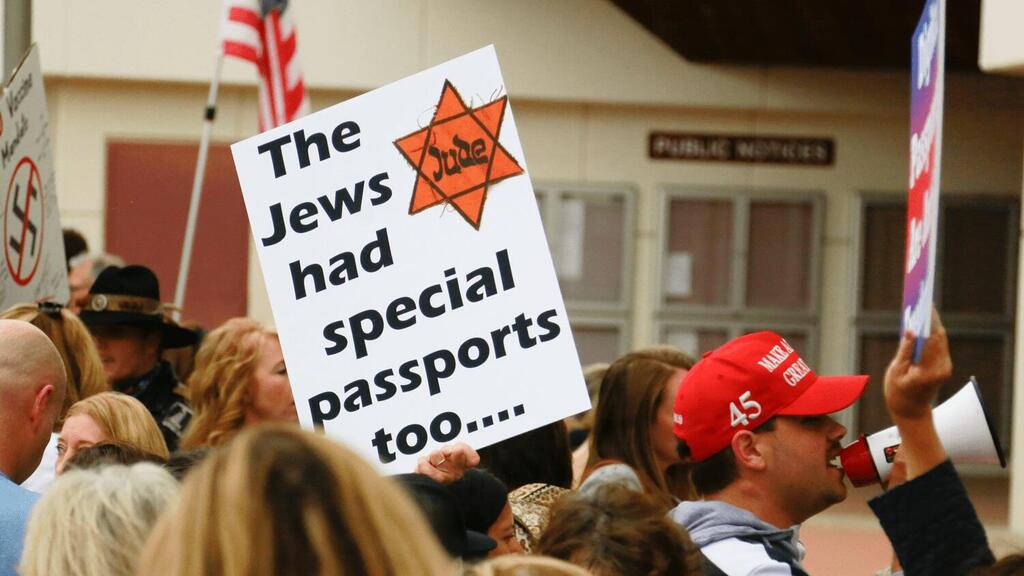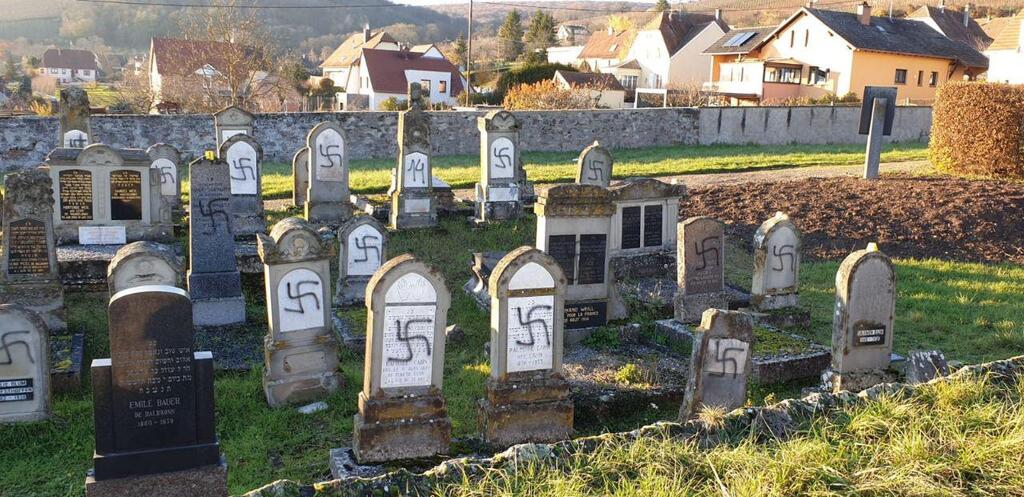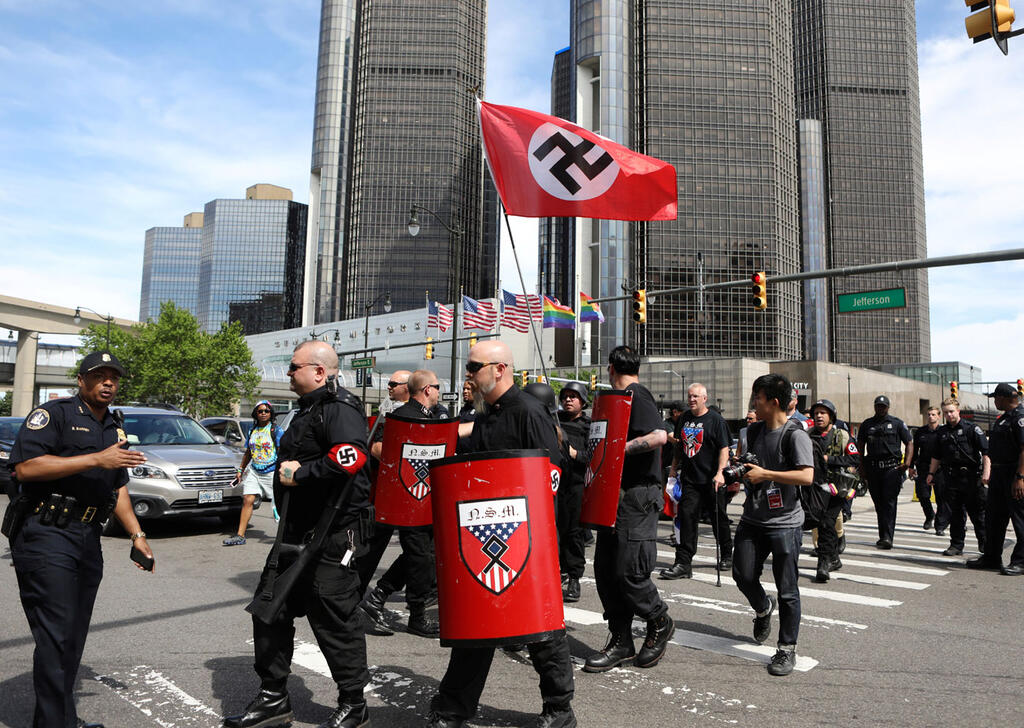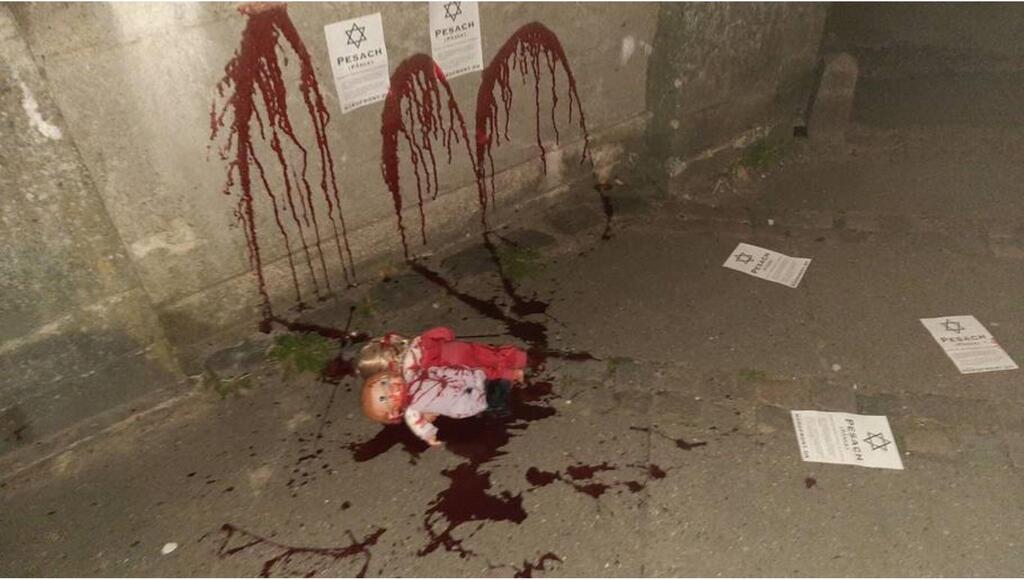Getting your Trinity Audio player ready...
Last year saw the most anti-Jewish incidents worldwide in a decade, according to “The Antisemitism Report for 2021” published on Monday by the World Zionist Organization and the Jewish Agency.
In some places, such as New York City, for example, the number of anti-Semitic incidents doubled over 2020. In many others, among them the UK, Austria and Germany, antisemitic incidents reached new highs. And countries such as Australia and Canada presented surprising dramatic increases.
5 View gallery


Residents outside of a supervisors’ meeting in Orange County, California protest COVID-19 vaccine requirements
(Photo: The Media Line)
The real number of incidents is significantly higher since many are not reported, often out of fear, the researchers underlined.
The most significant peak took place in May, when many triggering events took place, including Eid al Fitr, Israel’s Jerusalem Day, Nakba Day and Al-Quds Day, as well as the IDF’s Operation Guardian of the Walls against Hamas and Islamic Jihad in the Gaza Strip, violence between Jewish and Arab citizens of Israel in “mixed cities,” where large numbers of both communities live, the TikTok terror trend in the streets of Jerusalem, and the ongoing public controversy regarding disputed apartments in the city’s Sheikh Jarrah neighborhood.
Raheli Baratz-Rix, head of the World Zionist Organization’s Department for Combating Antisemitism and Enhancing Resilience, told The Media Line that these events usually trigger anti-Semitic incidents around the world.
She added, however, that the COVID-19 pandemic also had a lot to do with this severe increase in incidents. The old conspiracies about the Jews controlling the world in the economic sphere were rapidly ascribed to the pandemic, she pointed out.
5 View gallery


Robert Keith Packer wore a “Camp Auschwitz” shirt while participating in the Jan. 6, 2021 attack on the U.S. Capitol in Washington, DC
(Photo: The Media Line)
The first anti-Semitic slogan that blamed Jews for the novel coronavirus came from the Arab world, Baratz-Rix said, in the form of “COVID48,” referring to 1948, the year when the State of Israel was founded. Then the tendency spread to Europe and the rest of the world.
According to the report, in 2020, with the beginning of the virus outbreak, a lot of antisemitism campaigns linking Jews to the coronavirus were seen in the digital sphere, but in 2021, these conspiracy theories reached the streets.
Another phenomenon that grew in strength last year was the trivialization of the Shoah, carried out to “diminish the dimensions of the Holocaust and its historical uniqueness and importance.”
Baratz-Rix said, “Opponents of vaccination from all over the world used symbols from the Holocaust to protest,” leading to the “trivialization of the Holocaust.” She added that the only solution for this is to pass laws against the use of Holocaust-related symbols out of context. “The only country that has such a law in Germany,” she said.
Europe accounted for 50% of the reported anti-Semitic incidents in 2021. Baratz-Rix attributed this to the high level of awareness of antisemitism among the continent’s Jews and the high rate of reporting compared to other parts of the globe
Russia, on the other hand, was one of the only countries where the number of reported incidents decreased.
Alexander Boroda, chairman of the Executive Board of the Federation of Jewish Communities of Russia (FJCR), which unifies Orthodox communities, mostly Chabad, shared his thoughts with The Media Line.
First, he clarified that the number of incidents indeed decreased in Russia in 2021. Boroda said this happened for a variety of reasons.
First, he said, Russian law enforcement is very effective, adding, “The government works hard to achieve a ‘peaceful home.’”
Second, he continued, the state’s support of the Jewish community is certainly a factor. “The government supports us; they say that Judaism is one of the most important religions in Russia and they respect us.”
Boroda also said diplomatic ties between Jerusalem and Moscow are very stable. “Israel has good relations with Russia and does not participate in any proposal to impose sanctions against Russia.”
Then he pointed to what he said were the very good relations between the religious institutions in Russia and between Jewish, Christian, and Muslim leaders.
Lastly, he explained, “Many Russians have either traveled to Israel or have Jewish friends.”
All these factors combined helped to avoid the increase in anti-Semitic incidents seen around the world in 2021, Boroda said.
Baratz-Rix expressed concern about the hatred of Jews globally. “This year there were more than 10 anti-Semitic incidents around the world daily,” she said. “We do not see the end; every year there are more and more incidents.”
Nevertheless, she suggested there are things that both the governments and the Jewish communities in the countries where this is taking place can do to improve the situation. Governments “should work to raise awareness of the situation among their citizens.”
Baratz-Rix urged Jews in the Diaspora to try to bolster their ties with their local Jewish community, strengthen their Jewish identity and “fear no more,” report incidents and practice their religion as they please.




